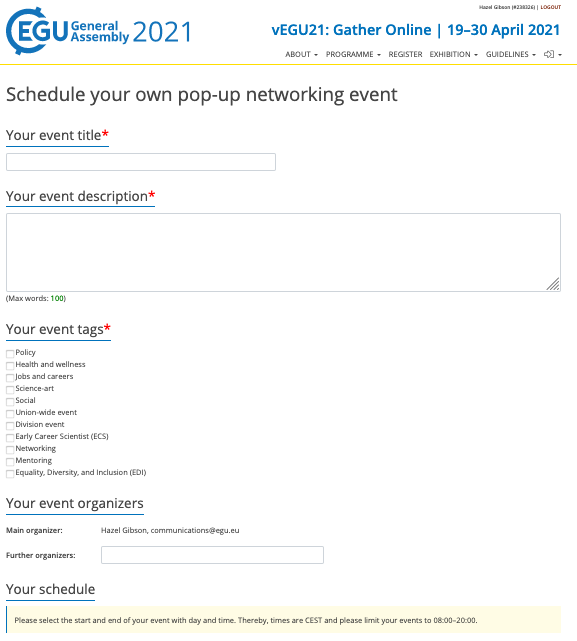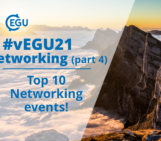
This year, for our annual General Assembly, EGU and our conference provider Copernicus have been working hard to provide a much wider range of networking options than we were able to do in the very short time frame we had, in 2020. These networking options are collected into two types: the Conference Networker, with the ‘Handshake’ function; and the Pop-up Networking Scheduler. This post will focus on the Pop-Up Scheduler which lets attendees organise their own networking events on whatever platform they want! The Conference Networker and Handshake were the focus of a previous blog linked here.
The Pop-Up Scheduler is available today and can be accessed by logging into the vEGU21 platform. The Scheduler is designed for anyone who wants to run their own event, of any kind and any size, at the Assembly. These could be small events that focus-in on a particular scientific quirk or intriguing phenomena, to spaces for building a community or celebrating a success. If you’ve attended a previous assembly you may have been inspired by member-led events like the Games Night or Rhyme Your Research. The Pop-Up Scheduler is the perfect opportunity to take the next step and try your own event from sharing an inspiring documentary, demonstrating your science, or catching up with colleagues.

A screen shot of the pop-up networking scheduler, that you can access from the front page of egu21.eu by clicking ‘Schedule a pop-up networking event’.
Using the Pop-Up Scheduler is simple: enter your event title, description, date, and time, then provide a link to your platform. Once submitted it will be added to the conference programme. To make it easier to find in the programme you have the option to add tags detailing whether the events are related to policy, health and well-being, Equality, Diversity, and Inclusion, and more! You can link to any platform you like: the Pop-Up Scheduler is designed to be flexible and meet the needs of the membership, so attendees should feel free to organise events using platforms from Zoom or Gathertown to Animal Crossing. Unsure what platform to use? Then check out the list below for inspiration:
- Animal Crossing: a video game franchise all about building and looking after a community of animal characters, the Switch version Animal Crossing: New Horizons provided escapism to thousands in the wake of the COVID19 pandemic in early 2020. Users can build their own tropical island, organising your village and landscape however they wish before inviting guests over to socialise and interact with their mini-paradise.
- Discord: a popular community-building platform particularly with video gamers, Discord attendees can join different channels – or topics – where they may communicate with one another through text chat, voice, or video and easily share files or media as they build their community.
- Gathertown: a virtual networking platform that uses proximity-based video conferencing tools which allow you approach and interact with other people similar to how you would in real life! By using a customisable avatar to explore a virtual environment, you can approach other avatars as you would approach people at a physical Assembly; nearing others activates the video and audio functions which allow you to interact, whilst walking away deactivates them. In this way Gathertown helps to simulate real-world interactions not possible on other platforms and provides attendees more agency over who, when, and how they interact with one another, all in an eye-catching and engaging environment!
- Google Hangouts: free video calls, text chat, and file sharing; Google Hangouts allows users to use the Gmail contacts to quickly set up video-to-video meetings.
- Microsoft Teams: similar to Google Hangouts, users can set-up joint video calls with multiple people, participate in text chats, share files, or even work on documents together.
- Minecraft: this widely popular video game lets users build massive digital environments. Adaptable to the user’s imagination, Minecraft spaces have been used as an education tool, visualise the cost of carbon emissions, and demonstrate programming logic. Users can explore these structures and engage in the worlds you create, or connect with each other as you create your own landscape.
- Skype: simple and familiar to many, Skype allows you to share files, use text-based chat, and quickly set-up group video calls online.
- Slack: quickly becoming the go-to for office communication outside of emails, Slack allows you to quickly create and organise different communication channels where people can participate in text-based chat or share files whilst easily keeping track of the conversation.
- Twitch: the popular live-streaming service used for everything from talk shows to cooking and video gaming. Attendees can watch live demonstrations or performances whilst asking questions or converse using the text-based chat.
- Zoom: the now-familiar video conferencing platform provides accessible tools which allow for face-to-face meetings, including the capability for larger sessions to be split into smaller groups, or “breakout rooms”, which allow for more personable discussion in smaller groups. Alternatively, you might want to use the Webinars format where attendees may submit questions to panellists and vote on the questions they think require the panellist’s attention. Be sure to check out its auto-captioning tool too!
- Video-sharing platforms: Looking to share your favourite sci-comm videos with colleagues, indulge your favourite nature documentary, or reflect on presentations past? Platforms like tv and Watch2gether allow you watch content together with other attendees from video services like Youtube or Vimeo with minimal effort.
Alternatively, signing up to websites such as Scener, Kast, and TwoSeven means you can watch content over a number of streaming services like Netflix or Disney+.




